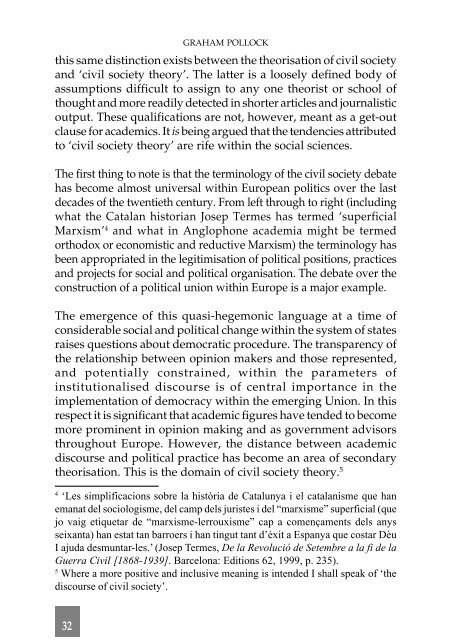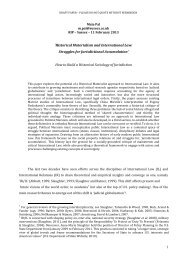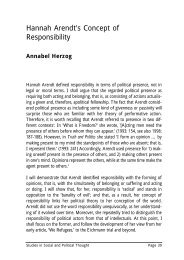Civil Society Theory and Euro-Nationalism - University of Sussex
Civil Society Theory and Euro-Nationalism - University of Sussex
Civil Society Theory and Euro-Nationalism - University of Sussex
Create successful ePaper yourself
Turn your PDF publications into a flip-book with our unique Google optimized e-Paper software.
32<br />
GRAHAM POLLOCK<br />
this same distinction exists between the theorisation <strong>of</strong> civil society<br />
<strong>and</strong> ‘civil society theory’. The latter is a loosely defined body <strong>of</strong><br />
assumptions difficult to assign to any one theorist or school <strong>of</strong><br />
thought <strong>and</strong> more readily detected in shorter articles <strong>and</strong> journalistic<br />
output. These qualifications are not, however, meant as a get-out<br />
clause for academics. It is being argued that the tendencies attributed<br />
to ‘civil society theory’ are rife within the social sciences.<br />
The first thing to note is that the terminology <strong>of</strong> the civil society debate<br />
has become almost universal within <strong>Euro</strong>pean politics over the last<br />
decades <strong>of</strong> the twentieth century. From left through to right (including<br />
what the Catalan historian Josep Termes has termed ‘superficial<br />
Marxism’ 4 <strong>and</strong> what in Anglophone academia might be termed<br />
orthodox or economistic <strong>and</strong> reductive Marxism) the terminology has<br />
been appropriated in the legitimisation <strong>of</strong> political positions, practices<br />
<strong>and</strong> projects for social <strong>and</strong> political organisation. The debate over the<br />
construction <strong>of</strong> a political union within <strong>Euro</strong>pe is a major example.<br />
The emergence <strong>of</strong> this quasi-hegemonic language at a time <strong>of</strong><br />
considerable social <strong>and</strong> political change within the system <strong>of</strong> states<br />
raises questions about democratic procedure. The transparency <strong>of</strong><br />
the relationship between opinion makers <strong>and</strong> those represented,<br />
<strong>and</strong> potentially constrained, within the parameters <strong>of</strong><br />
institutionalised discourse is <strong>of</strong> central importance in the<br />
implementation <strong>of</strong> democracy within the emerging Union. In this<br />
respect it is significant that academic figures have tended to become<br />
more prominent in opinion making <strong>and</strong> as government advisors<br />
throughout <strong>Euro</strong>pe. However, the distance between academic<br />
discourse <strong>and</strong> political practice has become an area <strong>of</strong> secondary<br />
theorisation. This is the domain <strong>of</strong> civil society theory. 5<br />
4 ‘Les simplificacions sobre la història de Catalunya i el catalanisme que han<br />
emanat del sociologisme, del camp dels juristes i del “marxisme” superficial (que<br />
jo vaig etiquetar de “marxisme-lerrouxisme” cap a començaments dels anys<br />
seixanta) han estat tan barroers i han tingut tant d’èxit a Espanya que costar Dèu<br />
I ajuda desmuntar-les.’ (Josep Termes, De la Revolució de Setembre a la fi de la<br />
Guerra <strong>Civil</strong> [1868-1939]. Barcelona: Editions 62, 1999, p. 235).<br />
5 Where a more positive <strong>and</strong> inclusive meaning is intended I shall speak <strong>of</strong> ‘the<br />
discourse <strong>of</strong> civil society’.
















